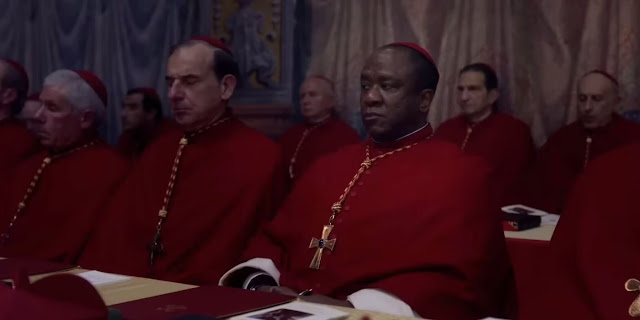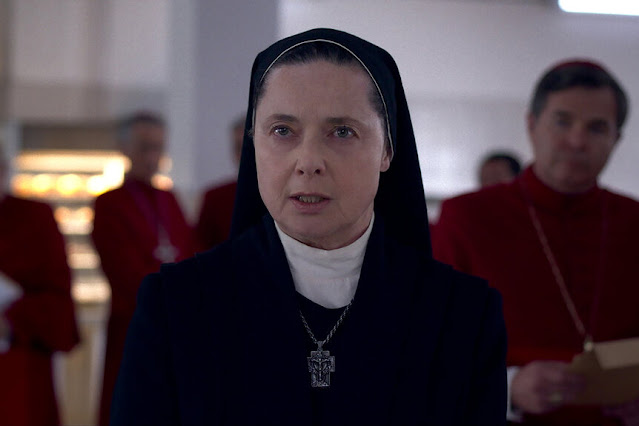When I first became aware of the existence of Conclave my first thought was “Didn’t we just have a film about this very subject?” I was, of course, thinking of the 2019 film The Two Popes that was up for a couple of Academy Awards that year. What I didn’t remember is that the majority of that film is the current pope and the man who is destined to be the future pope spend most of that film finding common ground in difficult times. That isn’t so much a film about selecting the new pope as it is about bridging the gap between different thinking people, something this world could definitely learn from. 2024’s Conclave is about an entirely different thing altogether, although it shares some of the same messages.
Conclave is billed as a political thriller but this is a bit of a misnomer. It’s more of a character study and a look at the levels some men, even those who consider themselves holy, will go to take power. How appropriate this subject is right now. The film opens with the unexpected death of the current pope. The College of Cardinals, under the leadership of Dean Thomas Lawrence (Ralph Fiennes), convenes to elect his successor. This entails the gathering of the cardinals and a written vote, repeated until there is a two-thirds majority win. The four leading candidates are Aldo Bellini (Stanley Tucci), a liberal much like the late pope; Joshua Adeyeni (Lucian Msamati), a social conservative from Nigeria; Joseph Tremblay (John Lithgow), a moderate from Canada; and Goffredo Tedesco (Sergio Castellitto), a staunch traditionalist from Italy.
Even before the first votes are cast there is doubt being thrown into the air over the worthiness of the frontrunners. Lawrence is informed that the late Pope met with Tremblay just prior to his death and demanded his resignation. Tremblay denies that this happened and without proof there is nothing more that seemingly can be done. Still, this accusation creates doubt in the worthiness and motives of the man. Tedesco may be a traditionalist but he is also pompous and a racist. He wants to prevent the position going to anyone that isn’t Italian, and especially not Adeyeni, a black man. Bellini tells his supporters that his goal is to simply prevent Tedesco from winning the vote. Adeyeni seemingly has no faults and appears to be a humble man who happens to command the most support from the rest of the cardinals as evidenced in the tally from the first vote.
Added into the mix is the sudden arrival of Archbishop Vincent Benitez (Carlos Diehz) of Kabul, a man who was named cardinal in pectore (unannounced to the public) by the late pope the previous year. Benitez has some mystery in his background that was between him and the late pope that puzzles Lawrence and he has one of his assistants do a little digging into it. Before the first vote, Lawrence gives a short speech, encouraging the college to embrace uncertainty which is misinterpreted by some to be a declaration of his own ambitions for the position. This siphons away some of the votes from Bellini who is rightfully upset with Lawrence for this. Lawrence, who cast his own vote for Bellini insists he has no such ambition. The film continues with vote after vote as new things come to light, past transgressions derail ambitions, and ultimately the right man wins the popular vote and accepts the new calling.
On the surface the idea of a film about this subject would seem like a particularly dry subject. But in the competent hands of director Edward Berger and screenwriter Peter Straughhan there is never a dull moment to be found. Berger previously helmed the Oscar nominated All Quiet on the Western Front in 2022 and has proven himself more than capable of tackling tough subjects. Likewise, Straughhan has a history of writing screenplays that tackle dense subjects including the Oscar nominated Tinker Taylor Soldier Spy. That film was not the easiest film to get into but rewards those who put in the effort. Conclave is not as dense of a film as that and is a lot easier to get into than either Tinker Taylor Soldier Spy or All Quiet on the Western Front. Where it struggles, though, is being about a subject not many will be interested in.
For a lot people, there just isn’t that much interest in Catholicism and the processes in place to elect a new pope. If you’re not Catholic, there is very little reason to care enough to pay attention to a papal election, much like an American following the changing of the British monarchy. Sure, there are some that pay attention, but mostly it is looked at by outsiders as nothing more than a mild curiosity at best. Add to that the increase in atheism and agnosticism, and you see large groups of people who just don’t care about this subject. This can be seen reflected in the relatively low box-office for this film. Since it was made fairly cheaply, that doesn’t really matter because it still turned a profit, but it will get most of its views from those of us who follow the Oscars and will stream it on Peacock.
By being about a subject that matters to such a narrow group of people, it makes it difficult to attract an audience. That is unfortunate because the subject matter is actually quite fascinating. This isn’t just about selecting the new pope; it is also about what makes us who we are. It is about corrupting ambitions. It is about how our world has changed, and the old way of thinking isn’t necessarily the right way to think. That’s not to say morals need shifted, but our worldview does. We see this right away from Cardinal Tedesco when he makes a disparaging remark to Lawrence, asking him if he could imagine one of them being the new pope, indicating the cardinals from Nigeria. It’s a despicable remark, and Lawrence rightfully excuses himself from Tedesco’s presence so he can mingle with the others. One thing Tedesco does point out that is definitely true is that we tend to intermingle with those we are alike. He points out in the cafeteria that the Italians sit with the Italians, the Spaniards with the Spaniards, and so forth. It’s simply easier to socialize with like-minded people, but that keeps us from truly embracing each other as fellow members of God’s family.
Throughout the voting process, we learn more about each of the candidates and why public perception can keep an otherwise perfectly good candidate from securing the election. One mistake from decades ago can interfere with ambition. One man who is willing to do whatever it takes to win can sway the vote away from a more competent choice. And one man’s personal weaknesses and indecision come to life when the situation gets difficult, exposing his inability to be the new leader. Each time the cardinals present their individual votes, they offer a declaration that they are voting true to their heart and mind who they think should be the one to take on the role of the pope, and with each round of votes those convictions change, sometimes for legitimate reasons and sometimes otherwise.
This is an examination of social order and ambition. It’s also a bit of a mystery as we have not only the final meeting between the late pope and Tremblay to figure out but also Adeyemi’s dark secret buried deep in the past. One of the cardinals discovers this secret and makes arrangements to cast doubts on Adeyemi’s ability to be the pope for his own gain in the votes. Sister Agnes (Isabella Rossellini) has a memorable scene exposing this machination in front of the rest of the cardinals, derailing this scheme, but not before it’s too late for Adeyemi. We also have the mystery surrounding Benitez. Why was he called to be a Cardinal in pectore? The answers come but not all at once and with each piece of the puzzle comes more questions.
There are always people out there willing to do anything to gain power. It’s an old proverb that tells us the best leaders are those who do not seek it but have it thrust upon them. The scriptures teach us that the humblest among us will be made strong, yet even in religious hierarchy there are those whose ambition blinds them to the humility such an office requires. This is human nature and often those who deserve it least manage to secure, through shady deeds, positions of power. In Conclave, those shady dealers are fretted out and the one man sitting quietly in the background is slowly elevated to a majority vote. His revelation in the final act is unexpected and challenges Lawrence almost as much as anything he sees in Adeyemi, Tedesco, Bellini, and even Tremblay. That revelation, known only to the man himself and the late pope, opens Lawrence’s eyes to something that troubles him but also is a new way to look at the world and the people in it. How he will ultimately respond is left unanswered.
Academy Award Nominations:
Best Picture: Tessa Ross, Juliette Howell, and Michael A. Jackman
Best Actor: Ralph Fiennes
Best Supporting Actress: Isabella Rossellini
Best Adapted Screenplay: Peter Straughan (won)
Best Original Score: Volker Bertelmann
Best Editing: Nick Emerson
Best Production Design: Suzie Davies and Cynthia Sleiter
Best Costume Design: Lisy Christi
____________________________________________________
Release Date: October 25, 2024
Running Time: 120 Minutes
Rated PG
Starring: Ralph Fiennes, Stanley Tucci, John Lithgow, Sergio Castellitto, Isabella Rossellini, and Merab Ninidze
Directed By: Edward Berger










Comments
Post a Comment